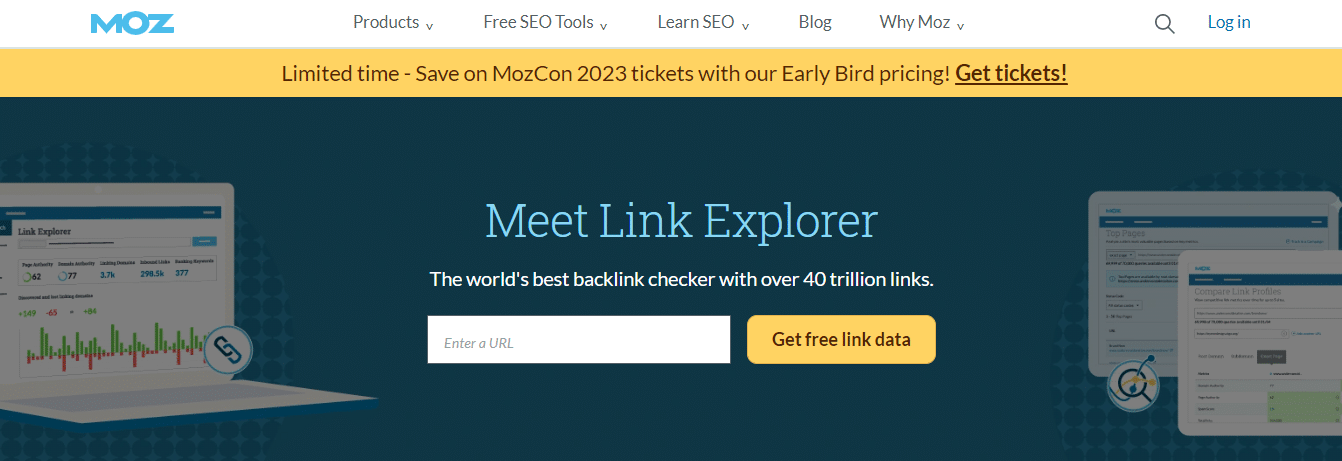Table of Contents
What Is Domain Authority and How It Works

If you want to get started in backlinking or are planning a digital marketing strategy, then you must’ve surely come across the term “DA” accompanied by a number. But what is Domain Authority, and how does it affect you?
In short, it’s a ranking metric used by many companies to analyze the results of their marketing strategies. But there’s a lot more to it. So, I’ve decided to put together this piece to serve as a beginner’s guide on domain authority. You’ll learn the definition, its relation to SEO, and even how to check your site’s DA.
I don’t want to keep you waiting, so let’s dive straight into it!
Table of Contents
What Is Domain Authority?
The concept of “domain authority” is often confused with other similar terms, so to kick off this post, I’d like to address that. This way, you can be sure you’re pointing your strategy in the right direction.
The general domain authority definition tells us that it determines a website’s quality and authority. But today, we’re focusing on Domain Authority —yes, with capital letters. This distinction is important, because the latter is a metric created by Moz to predict the likelihood of a website ranking in the SERPs (search engine result pages).
You should note that Google doesn’t use this metric as a ranking factor, but it is a useful indicator to assess your site’s performance in relation to your competitors’.
Other SEO platforms, such as SEMrush, have similar web authority metrics with different names. For example, you can find Domain Rating, Authority Score, Flow Metric Score, and more.
Lastly, you might also come across the term “Page Authority,” which is almost the same, but focused on a specific page ranking in the SERPs, rather than an entire website.
How Does DA Work?
When a brand-new website is launched, its domain authority score is only 1. As time passes, and the site gains backlinks, traffic, and so on, the score starts going up. But how does this work?
To calculate a site’s authority ranking, most online tools use specialized algorithms that take several factors into account. For example, Moz uses machine learning calculations and considers more than 40 different factors, such as root domains, search traffic, and inbound links, to determine domain rating.
In the context of a digital marketing strategy, this means that simply having a website up and running isn’t enough. You need inbound links to your blog posts and even to your product pages if you want a decent score.
How to Check Domain Authority
There are many tools out there that can help you discover and keep track of your DA.
Moz, for example, allows you to do so for free through a tool called “Link Explorer”. You just need to create an account, verify your email, and then enter your domain’s root URL to get an in-depth analysis.
I highly recommend that you consistently check your DA score, so you can know exactly how you compare to other companies in your industry.
What Is a Good Domain Authority Score?
The DA metric ranges from 1 to 100, with the higher numbers hinting at better results in the SERPs. So, the greater your domain rating is, the more likely it’s that your web traffic and rankings will increase.
While there are no fixed rules on what makes a score good or bad, it’s generally accepted that scores:
- above 60 are excellent;
- between 50 and 60 are good;
- between 40 and 50 are average;
- between 30 and 40 need to be improved; and
- below 30 are poor.
The best way to determine if your DA is good is by comparing yourself with competitors. See how they’re doing and discover whether you should work on your score or can relax for the moment.
Your DA can fluctuate over time, so don’t despair if you suddenly see it go down. Instead, focus on consistently building your domain authority with the techniques I’ll show you next.
How to Improve Your Authority Ranking
DA is highly relative. This means that if your direct competition suddenly gained a million new links (let’s hope this never happens!), your score would drop relative to it. That’s because an established and authoritative site will have stronger link profiles than you, and thus occupy the high-DA spots.
For that reason, it’s always easier to grow your score from 20 to 30 than from 70 onwards. However, you shouldn’t worry because whether you’re just launching a new website or want to improve a low DA score, there are some effective strategies you can use to climb the rankings:
1. Upload engaging content consistently
This is fundamental for keeping people on your site. Metrics such as organic traffic, time spent on page, and bounce rates are big indicators of engagement and can often have a big impact on your domain authority score. So, it’s no surprise that creating quality content like useful blog posts or entertaining videos is among the top strategies to boost your DA.
2. Work on your backlinks
Backlinking is another domain ranking pillar, and having valuable links to your site will considerably help your efforts. There are a few ways of doing this, from enlisting the help of a professional link-building company to using the “skyscraper method” and finding gaps in your competitors’ content that you can take advantage of.
3. Strengthen your link profile
In simple words, your link profile is the list of all those backlinks to your website. The bigger the number of high-quality links, the stronger your profile. So, you need to audit your links and determine which are worth keeping, which are dead or low-quality and need to be replaced.
Look for trusted sites to collaborate with and get those sought-after incoming links to improve your domain authority.
Wrapping Up
When it comes to digital marketing and SEO, there are so many terms and metrics to keep track of that it’s quite easy to get lost. Domain authority, in particular, can often be confusing because different tools name it and calculate it differently.
Hopefully, this guide has helped clear any doubts you might have about DA and its relevance in the digital landscape. All that’s left for you now is to go check your score and discover whether there’s anything on your website that can be improved upon to boost your numbers.





